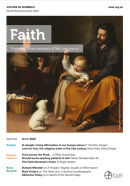Book Review: The Other Sun
Insights from Orthodoxy
Review by Mark Vickers
The French have a thing about Russia and about Orthodoxy. Perhaps it derives from folk memories of a questionable road trip back in 1812. Or possibly it appeals to latent Gallican tendencies. The British, by contrast, are far more insular. I confess to having previously known nothing about Olivier Clément. Born in 1921, he came from a region of southern France where Catholicism had ceased to be a living force in the sixteenth century. Protestantism gave way seamlessly to an atheistic socialism. Clément was raised, he admits, ‘a Mediterranean pagan,’ a votary of the ‘religion of the sun.’
His spiritual memoirs, originally published in French in 1975, chart his journey to Orthodoxy via Marxism and the religions of the East. Ultimately, neither convinced. Marx had nothing to say about death. The East failed to give sufficient prominence to personal freedom and responsibility. Clément came to appreciate that he was seeking for the inter-personal relationship which is to be found only with the God of Moses and of Jesus Christ.
Orthodoxy
Why did Clément turn to Orthodoxy rather than Catholicism? His contact with Catholicism in childhood and youth was minimal. In the pre-Conciliar period he was seeking after truth and beauty and meaning. Scholasticism failed to capture his imagination. He queried the exclusive depiction of the crucified Christ. The West, he alleged, had compartmentalised theology, liturgy, spirituality and social action which were intended for mutual nourishment. He claimed mid-twentieth-century French Catholicism to be legalistic and worldly. Protestantism he thought little more than a staging post to religious scepticism.
In Orthodoxy he found song and poetry. He found greater emphasis on Trinitarian theology, the Resurrection and the Holy Spirit. Clément was captivated by the light and openness in the face of Christ which he found in Orthodox iconography.
The cosmic Christ
He speaks of ‘the cosmic Christ,’ something those in the Faith Movement would wish him to have developed a little further. Clément simply could not believe that literature and culture were the product of ‘the blindest chance.’ Meaning and justice were not achieved by ‘the evolution of matter.’ From the perspective of who appreciates art and beauty, Creation pointed to an intelligent mind responsible for the universe. From intuition, rather than deduction, Clément sensed an ‘inner connection’ of all that is.
Orthodoxy seemed to offer the mysticism of the East, while firmly rooted through Scripture and the Church Fathers in the Person of Christ. Clément valued in Russian Orthodoxy ‘the ability to perceive the extraordinary nature of the ordinary.’ Asking him to define quite what he meant by this would for him, no doubt, be evidence of the legalistic Latin mind.
Western influences
Yet Clément was in no sense a closed or fiercely nationalistic proponent of Orthodoxy. He speaks fondly of St. Thérèse of Lisieux and Charles de Foucauld. He was fortunate to be formed by Russian theologians open to Western influences. His great mentor, Vladimir Lossky, was a doctoral student of Étienne Gilson, wrote on Meister Eckhart and venerated St. Francis of Assisi. Lossky helped Clément to arrive at an adequate understanding of the human person in the light of Trinitarian theology and Christology. His Orthodox faith was deeply ecclesiastical and Eucharistic.
Clément willingly admitted the historical weaknesses of Orthodoxy and its need to learn from both Catholic popular piety and social action. He praised the positive developments of the ressourcement which contributed to the documents of the Second Vatican Council. If Clément found unattractive pre-Conciliar Scholasticism, he was far more alarmed by a tendency of post-Conciliar Catholicism to abandon doctrine in its entirety.
Challenging
This work adopts an approach which is novel and challenging to Latin Christians. It can also be frustrating. The style is discursive. There is a failure to develop insights, to tell the narrative in a structured and chronological manner. There are many references to Russian theologians and French academics which mean little to most Anglo-Saxons. (Helpfully, the editor and translator, Michael Donley, provides copious footnotes.) One is left wondering at times what represents Clément’s own thought and what is that of his teachers. Then what to make of statements such as Marx and Nietzsche are ‘in the Church’ when they protest against consumerism and hedonism?
The chronology meanders, but the work effectively ends with Clément’s baptism on All Saints’ Day 1952. He wrote forty books in total, seeking to engage theology and modernity. He was Professor of Church History at the Lycée Louis-le-Grand and, as a layman, taught at the Orthodox seminary in Paris. Before his death in 2009, he responded positively to St. John Paul II’s invitation to other Christians to contribute towards a common understanding of the Petrine ministry. Clément did so from the basis of Christology and Tradition. He hoped that Catholicism might rediscover Orthodoxy as part of its own tradition. He deserves a hearing from those of us previously unfamiliar with his thought and works.
Fr. Mark Vickers is parish priest of Holy Ghost & St. Stephen, Shepherd’s Bush in the Diocese of Westminster. He has published a number of works on Church history. His forthcoming book is Doing God? The Personal Faith of the Prime Ministers, Balfour to Blair.






